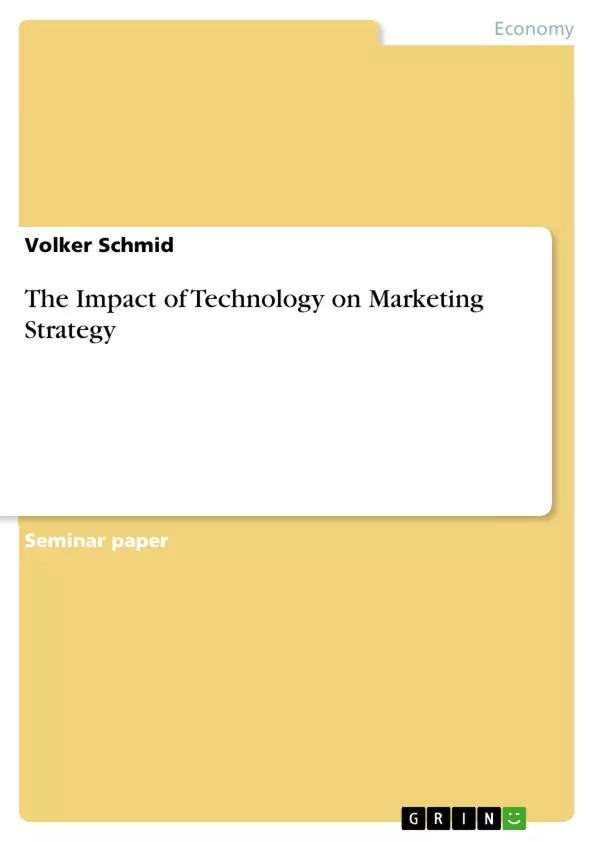According to O’Conner (1998), the impact of technology on marketing is dramatic. The industrial countries of today represent a growing information society which is based on technology. For an organisation “information is the most precious of modern corporate resources and its exploitation the key to competitive survival, the spotlight falls on marketing” (Mazur, 1994). To gather, handle and analyse the high amount of information, companies rely on technology. 1.5 billion pounds are invested on marketing related IT applications just in the UK (Leverick, 1998), which makes 15 percent of the total amount spent on IT, and this percentage is still increasing.
The aim of this paper is to evaluate the impact of all potential technologies on the marketing strategy, using a variety of industry and organisational examples, and addressing the implications and potentials for the future.
Therefore, it is necessary to firstly consider the range of current and potential future technologies that may or can be utilised in the company’s marketing function. Examples of how ‘real’ companies use this technology need to be provided and appropriate legal issues have to be discussed. Finally, possible technologies for the fictitious Business Technology PLC’s marketing function are suggested including a financial plan.
A wide range of technologies could be identified including hardware, software and communication technology. It could be shown that technology has a strong impact on the marketing strategy in terms of collect, handle, interchange, communicate, analyse, personalise and customise information, leading to cost reductions, more effective marketing procedures and improved customer satisfaction. The paper shows the technology-driven changes regarding the marketing mix.
The use of technology by marketers is regulated by the national Data Protection Act and European laws.
Finally, it is suggested that Business Technology PLC requires an internet presence, a database and a multimedia presentation of its products as a first step to increase sales, estimated set-up cost are approximately 5,500 pounds.
Table of Contents
- Abstract
- Table of contents
- Range of current Technologies.
- E-commerce
- CD ROM
- Broadband
- Phone, Mobile Phone, Short Messaging Service.
- Management Software and Database Marketing.
- Potential Future Technology: Interactive TV and ATM.
- Impact of Technology on Marketing Strategy
- Legal Issues
- Technology that can be utilised in the Business Technology PLC....
- Financial Plan
- Bibliography.
Objectives and Key Themes
This paper aims to evaluate the impact of technology on marketing strategy by examining various technologies, providing industry and organizational examples, and discussing future implications and potential. The paper also investigates legal considerations and suggests technology applications for a fictitious company, "Business Technology PLC," along with a financial plan.
- The impact of technology on marketing strategy, particularly in terms of collecting, handling, interchanging, communicating, analyzing, personalizing, and customizing information.
- The role of technology in cost reductions, effective marketing procedures, and improved customer satisfaction.
- The application of technology across the marketing mix.
- Legal issues surrounding the use of technology in marketing, including data protection.
- Specific technological applications for businesses, with a focus on potential implementation and financial considerations.
Chapter Summaries
- Range of Current Technologies: This chapter delves into various existing and emerging technologies, including e-commerce, email, CD ROM, broadband, mobile phones, management software, and database marketing. It provides examples from real companies to illustrate how these technologies are being implemented and their potential impact on marketing strategies.
- Impact of Technology on Marketing Strategy: This chapter explores the broader implications of technology on marketing strategy. It examines how technology can be used to collect, handle, analyze, and personalize information, leading to cost savings, more effective marketing practices, and enhanced customer satisfaction.
- Legal Issues: This chapter addresses the legal frameworks surrounding the use of technology in marketing, emphasizing data protection regulations and their importance in responsible marketing practices.
- Technology that can be utilised in the Business Technology PLC: This chapter presents suggestions for specific technology applications for a fictitious company, Business Technology PLC. It explores the potential benefits of an internet presence, databases, and multimedia presentations in enhancing sales and improving customer engagement.
Keywords
The core keywords and concepts explored in this paper include marketing strategy, technology, e-commerce, email marketing, database marketing, data protection, legal issues, financial planning, customer satisfaction, and the impact of technology on the marketing mix.
- Quote paper
- Volker Schmid (Author), 2005, The Impact of Technology on Marketing Strategy, Munich, GRIN Verlag, https://www.grin.com/document/38123



